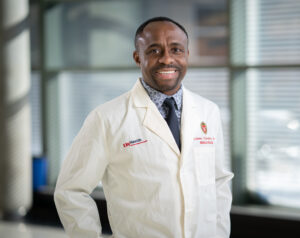Under Okonkwo’s direction, the study will commit $6.9M to curate educational opportunities that facilitate the participation of underrepresented groups in research careers and foster the training of a diverse workforce to meet the nation’s biomedical, behavioral, clinical, and translational needs in Alzheimer’s Disease and Related Dementias (ADRDs).

Dr. Ozioma Okonkwo, Associate Professor in the Department of Medicine and the Wisconsin Alzheimer’s Disease Research Center, has a long and successful record of investing himself in training the next generation of scholars in the biomedical field, especially persons from underrepresented groups (URG). He recently received funding from the National Institute on Aging (NIA), part of the National Institutes of Health to develop and expand his work in ways that will ensure a pathway of ethnoculturally diverse and culturally competent professionals fully prepared to study, evaluate, diagnose, and treat URG older adults with ADRDs in the coming years.
The HABS-HD Development Core is part of the Health & Aging Brain Study—Health Disparities (HABS-HD) project, a five-year, $148.78 million grant (U19AG078109) awarded to the Institute for Translational Research at University of North Texas Health Science Center at Fort Worth under the direction of Dr. Sid O’Bryant. The HABS-HD Development Core will be administered and supported by the Center for Health Disparities Research (CHDR) in the Wisconsin School of Medicine and Public Health, where Dr. Okonkwo is an Affiliate member.
Despite ongoing efforts at the federal level to facilitate the participation of URGs in research careers, underrepresentation remains a persistent problem: recent reports from the National Science Foundation, et al. show that persons from a URG background comprise only 5% of tenure-track neuroscience faculty despite making up a significantly larger segment of the US population.
Additionally, there is a disproportionate burden of ADRDs among underrepresented groups, especially African American and Hispanic populations. This excess ADRD morbidity, and its attendant socioeconomic costs, is expected to get even larger given that older URG adults are a rapidly expanding segment of the US population.
To address these urgent needs, the HABS-HD Development Core will provide both breadth and depth of training in specific ADRD-centered content areas including: Biomarkers, Biostatistics, Clinical Research, Community-Engaged Research, Neuroimaging, Neuropathology, Neuropsychology, and Omics; with an emphasis on Team Science, Leadership Development, and Grantsmanship, three competencies that are pivotal to career success. A unique feature of the Fellowship Program offered through the Development Core is that it will be open to not just the “traditional” biomedical sciences trainee but also to trainees from a wide range of disciplines such as public policy, journalism, arts, law, economics, and others.
In leading the Development Core, Dr. Okonkwo will be joined by Dr. Monica Rivera Mindt (Core Co-Leader, Fordham University), Dr. Rema Raman (Co-Investigator, ATRI, USC), and Dr. Barbara Bendlin (Expert Consultant, University of Wisconsin–Madison).